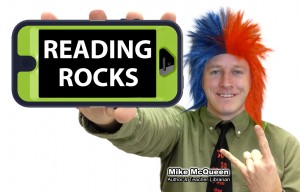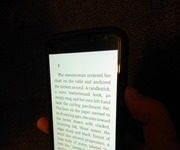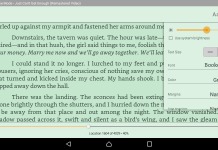 The infographic embedded below isn’t new; I’m pretty sure it was created about six months ago, in fact. But aside from its fantastic art, it always shares a truly important message: The vast majority of Americans don’t read.
The infographic embedded below isn’t new; I’m pretty sure it was created about six months ago, in fact. But aside from its fantastic art, it always shares a truly important message: The vast majority of Americans don’t read.
Check out the graphic’s first three stats, for instance, if you want to feel instantly depressed. (One-third of high school grads never read another book for the rest of their lives? Really?!)
I initially found that statistic pretty hard to believe. And unlike most infographics, this one doesn’t list its sources. (Shady!) So I decided to do a little research of my own. A Pew study we’ve reported on before was one of many studies and surveys I found about Americans’ reading habits:
According to the Pew Internet & American Life Project study titled “The rise of e-reading” (which discusses both print and electronic reading habits, and which was released in early April 2012), only 32 percent of adults over the age of 18 said they’d read somewhere between one and five books in the previous 12 months. Roughly one-fifth of the respondents, meanwhile (19 percent, to be specific), reported that they hadn’t read even one book in the preceding year. In other words, 68 percent of the respondents—which is roughly two-thirds—hadn’t even read one single book in the past year. (The complete report can be downloaded as a PDF here.)
I realize, of course, that I’m essentially preaching to the converted here. And yet these stats are probably worth thinking about nonetheless—especially on a day when many of us will soon be glued to our TV sets for three hours, enraptured by the sight of grown men playing catch. (Go Niners!)



































“only 32 percent of adults over the age of 18 said they’d read somewhere between one and five books in the previous 12 months. In other words, 68 percent of the respondents—which is roughly two-thirds—hadn’t even read one single book in the past year.”
Not so, unless you are looking at different data than I am. The chart on page 19 of the PDF (titled Book Reading Trends Over Time) did indeed state that 32% of adults over the age of 18 read 1-5 books in the last twelve months, however, it also states that only 19% read none (not 68% as you stated). 15% read 6-10 books; 26%, 11-50; and 5% over 50. (The remaining 3% either didn’t know or didn’t answer). That seems to be a much more realistic picture than what was stated above (which would have implied that no one reads more than 5 books in a year!)
Thanks Vonda, you’re right – I goofed on that one! I appreciate the close read,
That Infographic says that “light from the screen of ebooks and tablets is harmful…” Clearly, the person who created this knows nothing about ebooks, as they are are merely books in digital form. They are not devices at all, and therefore do not have screens; ereaders have screens, but if they are e-ink screens, they do not emit ANY light. Further, some ereaders can download books via 3G connections, and do not require either a computer or Internet access.
Kind of hard for me to take anything else it says seriously once its credibility is shot like that.
There is also the problem of how the definition of terms affects research results. Should we define reading in terms of books read (cover to cover) and then conclude that most Americans don’t read? Books read as a proxy for “reading” is not as good a metric as it used to be. In the digital era, a person can read voraciously and never complete a book or even start one.
For example, it may happen that textbooks disappear from schools entirely. Publishers are currently working assiduously on bringing traditional textbook content into Learning Management Systems and adding all sorts of features such as adaptive drill and practice, summative evaluation and so on. This could just as easily happen to fiction as to non-fiction.
Kids need an encyclopedia in the house? Encyclopedias are so twenty years ago.
The two best ways to make kids readers is to have at least one parent who read to them when they were little and who is a reader as an example.
Also, giving kids books they are interested in helps.
I had parents who read, but I didn’t become a serious reader until I checked out a horse book from the school library. The rest, as they say, is history.